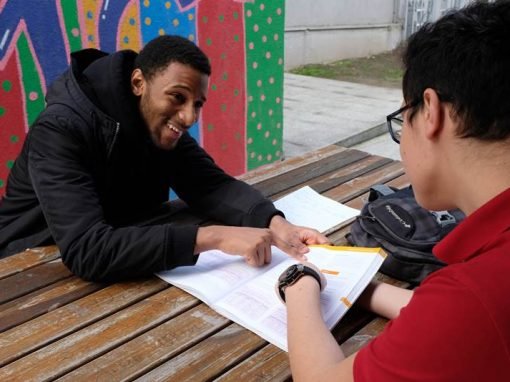Chemistry (9701)
Cambridge International AS and A Level Chemistry builds on the skills acquired at Cambridge IGCSE level. The syllabus includes the main theoretical concepts which are fundamental to the subject, a section on some current applications of chemistry, and a strong emphasis on advanced practical skills. Practical skills are assessed in a timetabled practical examination.
The emphasis throughout is on the understanding of concepts and the application of chemistry ideas in novel contexts as well as on the acquisition of knowledge. The course encourages creative thinking and problem-solving skills which are transferable to any future career path. Cambridge International AS and A Level Chemistry is ideal for learners who want to study chemistry or a wide variety of related subjects at university or to follow a career in science.
We expect students that register to this course, have an IGCSE certificate in Chemistry with a minimum mark of C or an IGCSE certificate in Combined Science with a minimum mark of B. If registering students have completed a curriculum that is not Cambridge International in grades 9 and 10, they will be required to sit an internal Chemistry examination at our High School Campus.
Link to full Syllabus: https://www.cambridgeinternational.org/Images/329530-2019-2021-syllabus.pdf
Key concepts
The key concepts on which this syllabus is built are set out below. If key concepts are mastered, learners can use the concepts to solve problems or to understand unfamiliar subject-related material.
- Atoms and forces
Matter is built from atoms interacting and bonding through electrostatic forces. The structure of matter affects its physical and chemical properties, and influences how substances react chemically.
- Experiments and evidence
Chemists use evidence gained from observations and experiments to build models and theories of the structure and reactivity of materials.
- Patterns in chemical behaviour and reactions
By identifying patterns in chemical behaviour we can predict the properties of substances and how they can be transformed into new substances by chemical reactions. This allows us to design new materials of use to society.
- Chemical bonds
The understanding of how chemical bonds are made and broken by the movement of electrons allows us to predict patterns of reactivity.
- Energy changes
The energy changes that take place during chemical reactions can be used to predict both the extent and the rate of such reactions.
Recognition and progression
The expertise in curriculum, teaching and learning, and assessment is the basis for the recognition of Cambridge International programmes and qualifications around the world. Every year thousands of students with Cambridge International AS & A Levels gain places at leading universities worldwide. They are valued by top universities around the world including those in the UK, US (including Ivy League universities), Europe, Australia, Canada and New Zealand.
UK NARIC, the national agency in the UK for the recognition and comparison of international qualifications and skills, has carried out an independent benchmarking study of Cambridge International AS & A Level and found it to be comparable to the standard of AS & A Level in the UK. This means students can be confident that their Cambridge International AS & A Level qualifications are accepted as equivalent, grade for grade, to UK AS & A Levels by leading universities worldwide.
Cambridge International A Level Chemistry provides a suitable foundation for the study of chemistry or related courses in higher education. It is equally suitable for candidates intending to pursue careers or further study in the chemical sciences, or as part of a course of general education.
Cambridge International AS Level Chemistry is the first half of Cambridge International A Level Chemistry. Depending on local university entrance requirements, the qualification may permit or assist progression directly to university courses in Chemistry or some other subjects.
Resources
The following are the preferred resources at Istanbul International School:
- Cambridge AS/A Level Chemistry 9701 Coursebook
- Cambridge AS/A Level Chemistry 9701 Workbook
Cambridge International Examinations
AS Level Candidates take:
Paper 1
Multiple Choice – 31% (1 hour)
This paper consists of 40 multiple choice questions, all with four options.
All questions will be based on the AS Level syllabus content.
Candidates will answer all questions.
Externally Assessed
Paper 2
AS Level Structured Questions – 46% (1 hour 15 minutes)
This paper consists of a variable number of questions, of variable mark value.
All questions will be based on the AS Level syllabus content.
Candidates will answer all questions.
Externally assessed
Paper 3
Advanced Practical Skills – 23% (2 hours)
This paper requires candidates to carry out practical work in timed conditions.
This paper will consist of two or three experiments drawn from different areas of the AS Level syllabus. Candidates will answer all questions.
Internally set, externally assessed
A Level candidates take:
Paper 1
Multiple Choice – 15.5% (1 hour)
This paper consists of 40 multiple choice questions, all with four options.
All questions will be based on the AS Level syllabus content.
Candidates will answer all questions.
Externally Assessed
Paper 2
AS Level Structured Questions – 23% (1 hour 15 minutes)
This paper consists of a variable number of questions, of variable mark value.
All questions will be based on the AS Level syllabus content.
Candidates will answer all questions.
Externally assessed
Paper 3
Advanced Practical Skills – 11.5% (2 hours)
This paper requires candidates to carry out practical work in timed conditions.
This paper will consist of two or three experiments drawn from different areas of the AS Level syllabus. Candidates will answer all questions.
Internally set, externally assessed
Paper 4
A Level Structured Questions – 38% (2 hours)
This paper consists of a variable number of structured questions each with a variable mark value (Section A) and a choice of one free response style question worth 15 marks (Section B).
All questions will be based on the A Level syllabus but may require knowledge of material first encountered in the AS Level syllabus.
Externally assessed
Paper 5
Planning, Analysis and Evaluation – 11.5% (1 hour 15 minutes)
This paper consists of a variable number of questions of variable mark value based on the practical skills of planning, analysis and evaluation.
Externally assessed
SUBJECTS














